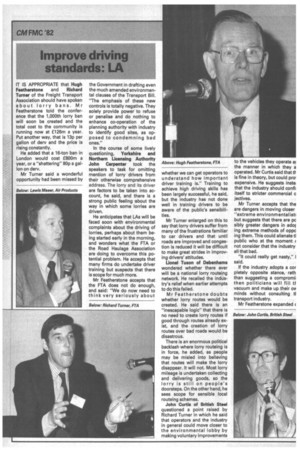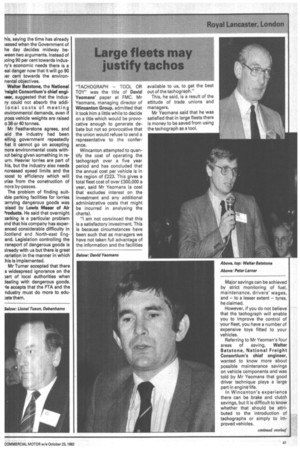IT IS APPROPRIATE that Hugh Featherstone and Richard Turner of
Page 26

Page 27

If you've noticed an error in this article please click here to report it so we can fix it.
the Freight Transport Association should have spoken about lorry bans. Mr Featherstone told the conference that the 1,000th lorry ban will soon be created and the total cost to the community is running now at £126m a year. Put another way, that is 13p per gallon of dery and the price is rising constantly.
He added that a 16-ton ban in London would cost £800m a year, or a "shattering" 80p a gallon on derv.
Mr Turner said a wonderful opportunity had been missed by
the Government in drafting even the much amended environmental clauses of the Transport Bill. "The emphasis of these new controls is totally negative. They solely provide power to refuse or penalise and do nothing to enhance co-operation of the planning authority with industry to identify good sites, as opposed to condemning bad ones."
In the course of some lively questioning, Yorkshire and Northern Licensing Authority John Carpenter took the speakers to task for omitting mention of lorry drivers from their otherwise comprehensive address. The lorry and its driver are factors to be taken into account, he said, and there is a strong public feeling about the way in which some lorries are driven.
He anticipates that LAs will be faced soon with environmental complaints about the driving of lorries, perhaps about them being started early in the morning, and wonders what the FTA or the Road Haulage Association are doing to overcome this potential problem. He accepts that many firms do undertake driver training but suspects that there is scope for much more.
Mr Featherstone accepts that the FTA does not do enough, and said: "We do now need to think very seriously about whether we can get operators to understand how important driver training is." Training to achieve high driving skills has been largely successful, he said, but the industry has not done well in training drivers to be aware of the public's sensibilities.
Mr Turner enlarged on this to say that lorry drivers suffer from many of the frustrations familiar to car drivers and that until roads are improved and congestion is reduced it will be difficult to make great strides in improving drivers' attitudes.
Lionel Tuson of Debenhams wondered whether there ever will be a national lorry routeing network. He recalled the industry's relief when earlier attempts to do this failed.
Mr Featherstone doubts whether lorry routes would be created. He said there is an "inescapable logic" that there is no need to create lorry routes if good through routes already exist, and the creation of lorry routes over bad roads would be disastrous.
There is an enormous political backlash where lorry routeing is in force, he added, as people may be misled into believing that routes will make the lorry disappear. It will not. Most lorry mileage is undertaken collecting and delivering goods, so the lorry is still on people's doorsteps. On the other hand, he sees scope for sensible local routeing schemes.
John Curtis of British Steel questioned a point raised by Richard Turner in which he said that operators and the industry in general could move closer to the environmental lobby by making voluntary improvements
to the vehicles they operate ar the manner in which they a operated. Mr Curtis said that tl. is fine in theory, but could pro' expensive. He suggests inste. that the industry should confil itself to stricter commercial a jectives.
Mr Turner accepts that the are dangers in moving closer "extreme environmentalist: but suggests that there are pc sibly greater dangers in ador ing extreme methods of oppc ing them. This could alienate tl public who at the moment ( not consider that the industry all that bad.
"It could really get nasty," said.
If the industry adopts a car pletely opposite stance, rath than suggesting a compromii then politicians will fill if vacuum and make up their ov minds without consulting ti transport industry.
Mr Featherstone expanded c his, saying the time has already passed when the Government of he day decides midway beomen two arguments. Instead of ping 90 per cent towards indusry's economic needs there is a eal danger now that it will go 90 rer cent towards the environnental objectives.
Walter Batstone, the National 'reight Consortium's chief engileer, suggested that the indusry could not absorb the addiional costs of meeting tnvironmental demands, even if ross vehicle weights are raised 038 or 40 tonnes.
Mr Featherstone agrees, and aid the industry had been elling government repeatedly hat it cannot go on accepting nore environmental costs with)ut being given something in reurn. Heavier lorries are part of his, but the industry also needs ncreased speed limits and the )oost to efficiency which will wise from the construction of nore by-passes.
The problem of finding suitible parking facilities for lorries :arrying dangerous goods was • aised by Lewis Maser of Air 'roducts. He said that overnight )arking is a particular problem Ind that his company has experenced considerable difficulty in 3cotland and North-east Engand. Legislation controlling the ransport of dangerous goods is Weedy with us but there is great rariation in the manner in which his is implemented.
Mr Turner accepted that there s widespread ignorance on the )art of local authorities when baling with dangerous goods. ^le accepts that the FTA and the ndustry must do more to eduate them.


















































































































